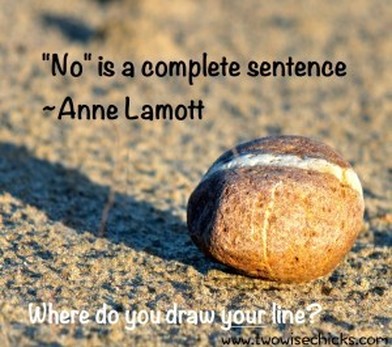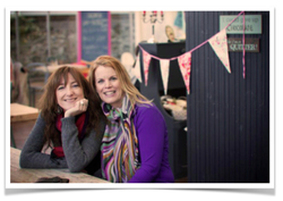|
Have you ever wondered what on earth people are banging on about when they mention 'healthy boundaries?' The word 'boundaries' comes up a lot in therapy, in coaching, in life actually! We may have a sense of what boundaries are but the concept can be difficult to describe. Boundaries are not concrete. There are no hard-and-fast rules, no one-size-fits-all to boundaries. So, if you're not sure what exactly they are, then you are most certainly not alone. Because we create and maintain our own boundaries, they are often something we don't even notice. It's becomes an 'unconscious habit'. If we are lucky, we've had parents or other adults who have role modeled healthy boundaries to us and we learn automatically how to have and set healthy boundaries, too. With some luck, we know when to say 'yes' or 'no' - and feel no fear when we do it. If we are lucky. But not everyone is that lucky. We know that healthy boundaries are rooted firmly in a clear sense of self-worth. If we value ourselves, we tend to have healthy boundaries and if we don't, or if we're uncertain about our worth, then our boundaries become fuzzy, weak, rigid, broken. And that means we are vulnerable to getting hurt or abused (or we may even hurt others!).If you have found yourself saying "People always take advantage of me" or asking "Why am I always treated so badly?!" then it's possible that you have "unhealthy" boundaries. The good news is that this is totally workable! So what do healthy boundaries look like? Do you have someone in your life whom you just know will not allow you to take advantage of them? Whom you just know will say 'no' if you try to push them to do something they don't want? Who won't meet you or do you a favour unless they are truly able and have the time? Who will respectfully give you time when it's right for them and who can say no to you without being aggressive or rude? Who won't take you on the mother of all guilt trips? That person has healthy boundaries. They are clear about what's right for them and they can stand their ground and own their decisions without attacking or blaming you, others or themselves. They have a strong sense of self worth - and by that we mean, they believe they are worthy of good treatment. And, even if you don't always like that they say no when you would rather that they say yes, you probably feel safe with this person. You have a sense that they are 'solid.' That's their boundaries that you're sensing right there People with healthy boundaries don't just treat themselves with respect - they naturally treat those around them with respect, too. So, what do unhealthy boundaries look like? An unhealthy boundary leads us to say 'yes' when we'd rather say 'no.' When we do that, we may become resentful, aggressive, and we may not take responsibility for our own choices and decisions. When we have poor boundaries, we often surround ourselves with similarly boundaried people and wind up being abused (or being abusive) - in mild ways all the way up to dangerous ways. Self-Assessment: If we are feeling like we are blaming others, or feeling victimised constantly, that might be a sign that our boundaries need some attention. So - now you've watched it - how would you rate your boundaries Here's another insight: sometimes our boundaries are really strong and healthy in some situations or with some people, and really poor with others. We challenge you to check: *What's happening to your sense of self-worth in the places where you have difficulty? * What are you saying to yourself about YOU? * What beliefs do you have that are influencing the way you allow yourself to be treated? Like Tanya says in the video there, our boundaries are not the responsibility of others. Naturally, we deserve respect. But we alone can teach other people that we believe we are worthy of that respect, and we can only teach others if we believe it about ourselves first. Now - have fun with those condoms! ;) Warmly, ps: Please feel free to comment below with any other analogies you can share with us to help explain the idea of boundaries - we'd love to hear them! pps: We wrote a detailed "Saying No" piece last year if you're interested in reading more. About the Authors Sally O’Reilly
Sally wants to help create a world of compassion for ourselves and others. A world where mistakes are allowed, gender roles don’t exist, sex ed in schools is a real thing and everyone dances – lovely! As a psychologist and psychotherapist in Ireland, she’s worked for nearly twenty years in private practice, with adults and trainee adults of all ages. She blogs on her own website, is a feature writer for super duper parenting website Voiceboks.com, does print and radio media work and has been known to Tweet. She’s the one running our Twitter page! When she’s not working, you will find her engrossed in Science Fiction or some dark and Danish TV show, listening to music, watching the sea (while really, really wishing it were warmer), or figuring out how to work Lightroom on her Mac. All while munching on Bombay mix. #multitasker! She’s happiest when dancing and erm…. her cat has his own Facebook page. We won’t link to that, it’s too embarrassing.. Tanya Tinney Tanya looks forward to living in a world where people know their worth, respect boundaries, and always have time for tea and chocolate. A magic bubble that protects her from sticky fingers, hormonal girls and dog hair would be awesome as well. Her education and much of her training is in the areas of psychology and human potential. She worked as a licensed psychologist for over 14 years, with 10 of those years spent building her own successful private practice. In total, she has over 20 years of varied experience working, volunteering for non-profit agencies, and consulting to small business. Most recently she has launched her dream online coaching practice where she gets to work with motivated, amazing women who need help overcoming life’s hurdles. Exciting times! She has lived in Ireland, Ethiopia (okay, just 6 months), Canada, and currently lives in central Texas with her husband, three girls (including fraternal twins), two dogs and three cats. When she’s not finding ‘everyday moments’ to write about here or on her own blog, you can find her being walked by her dogs, unearthing unidentifiable food-objects under the couch cushions or baking her famous banana bread. Tanya runs our Facebook page – and not to be outdone by Sally’s cat, her dog has its own Facebook page too.
0 Comments
|
Build Your Action Based Stress Reduction System
Popular PodcastsOlympian Suzy Favor Hamilton - From Fame to Prostitution to Advocacy
Hall of Fame Basketball Star Chamique Holdsclaw on Mental Resilience Diana Nightingale on her husband Earl Nightingale's Principles for Mental Health Success JoAnn Buttaro on Date Rape & PTSD Survival Story: Its Never Too Late Gabe Howard on BiPolar Advocacy Phil Fulmer on Teen Suicide Prison, Bipolar and Mania with Andy Behrman Columbia Univeristy's Dr. Rynn on OCD Archives
March 2018
Categories
All
|






 RSS Feed
RSS Feed





